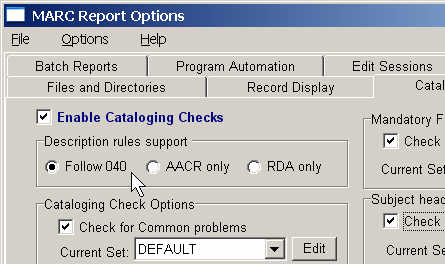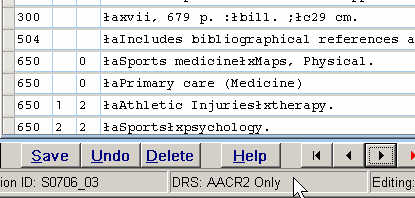Table of Contents
MARC Report: 'Description Rules' support
Some of the terminology, on this page, refers to new options that have been added to the Cataloging Check Options.
In the past individual cataloging checks could only be Enabled or Disabled. Beginning with version 236, individual cataloging checks can be set to: 'None' (disabled), 'AACR and RDA' (displayed for all records), 'AACR Only' (displayed for AACR records only), or 'RDA Only' (displayed for RDA records only).
You should visit Cataloging Check set changes and read the description of this change, before proceeding.
MARC Report 236 adds the following section to the Cataloging Checks page of the program options:
The default setting for this option is 'Follow 040', and we advise you to retain this setting.
If a record being checked is RDA (040 $e rda):
- 'DRS=RDA' displays 'RDA Only' and 'AACR and RDA' (shared) messages
- 'DRS=Follow 040' displays 'RDA Only' and 'AACR and RDA' (shared) messages
- 'DRS=AACR' displays a single message: '040 $e rda, but DRS=AACR' (reminding you that you say you want to change all RDA records to AACR)
If a record being checked is AACR (040$e aacr or no 040$e):
- 'DRS=AACR' displays 'AACR Only' and 'AACR and RDA' (shared) messages
- 'DRS=Follow 040' displays 'AACR Only' and 'AACR and RDA' (shared) messages
- 'DRS=AACR' displays a single message: '040 $e not rda, but DRS=RDA' (reminding you that you say you want to change all AACR records to RDA)
Here's a link to a flowchart of how this new option is designed to function.
http://www.marcofquality.com/pages/catchecks236-5.jpg
There are some fairly obvious differences between records that are cataloged according to RDA guidelines vs AACR rules; some of these differences can be picked up by MARC Report, others are not amenable to programatic validation. We will be adding as many checks as we can discover, and welcome any suggestions for additional checks. Some of the most obvious differences between RDA and AACR cataloging are:
- abbreviations–used by AACR, and not used by RDA unless found on the resource
- GMD–used by AACR, and not used by RDA
- 33X fields (Content, Media, Carrier Type information)–used by RDA, and not used by AACR
Most libraries will probably decide to keep RDA records as RDA records and AACR records as AACR records when they are copying records.
Some libraries might decide that the RDA approach is a significant improvement over AACR (RDA thinking does actually go far beyond the obvious differences listed above) and so all new records added to their catalogs should be RDA, which means changing all AACR records into RDA records.
A few libraries might decide that they are not ready for RDA and so all new records added to their catalogs should be AACR, which means changing all RDA records into AACR records.
MARC Report now supports these three approaches to records, using its 'Descriptive rules support' options.
Under 'Description rules support':
- choose, 'Follow 040', if you want to see RDA specific messages for records that are coded as RDA (040 $e rda) and AACR specific messages for records that are coded as AACR (040 $e aacr, or no 040 $e); i.e., choose this option if you have decided to keep RDA records as RDA records and AACR records as AACR records.
- choose, AACR, if you want to see AACR specific messages for all records, whether they are coded as RDA (040 $e rda) or AACR (040 $e aacr, or no 040 $e). When you encounter an RDA record:
- First, you will see a single message:
- Brief: “040: $e rda, but DRS=AACR”
- Detailed: “040 subfield $e (Description conventions) contains 'rda' (i.e., this is an RDA record), but your DRS Option is set to 'AACR only', meaning you want to edit RDA records to AACR–if you want to do this: change 040$e 'rda' to 'aacr', and edit the record; otherwise, disable this message by changing your DRS option to 'Follow 040'.”
- Then, if you follow the detailed instructions, and change 040 $e 'rda' to 'aacr', then you will see a list of changes that you will need to make in order to convert the RDA record into an AACR record. Don't stop with this list, however, as there will be other cataloging differences that MARC Report cannot detect, e.g., the choice of a family as a main entry.
- choose, 'RDA', if you want to see RDA specific messages for all records, whether they are coded as RDA (040 $e rda) or AACR (040 $e aacr, or no 040 $e). when you encounter an AACR record:
- First, you will see a single message:
- Brief: “040: $e not rda, but DRS=RDA”
- Detailed: “040 subfield $e (Description conventions) does not contain 'rda' (i.e., this is not an RDA record); but your DRS Option is set to 'RDA only', meaning you want to edit all records to RDA–if you want to do this: add 040$e 'rda', delete $eaacr (if there), & edit the record; otherwise, disable this message by changing your DRS option to 'Follow 040'.”
- Then, if you follow the detailed instructions, and change 040 $e 'aacr' to 'rda', then you will see a list of changes that you will need to make in order to convert the AACR record into an RDA record. Don't stop with this list, however, as there will be other cataloging differences that MARC Report cannot detect, e.g., RDA allows inclusion of names from sources other than the title page in a 245$c statement of responsibility.
Note: In version 3, the current setting for Description Rules Support is always visible at the bottom of the screen, in the second status bar panel (i.e., 'DRS: '):
Terminology
We are using the phrase 'Shared cataloging checks' to refer to all cataloging checks that are set to 'AACR and RDA' in the default cataloging check set.
Individual Cataloging Checks
Individual cataloging checks can also be configured in a similar manner. For example, each cataloging check may be configured to:
- not run at all (i.e. disabled)
- run on all records (i.e. disregard the 040)
- run only on AACR records
- run only on RDA records
Click here for more information on customizing individual cataloging checks.
![[MARC Report]](/w/lib/tpl/dokubook/images/logo.jpg)


